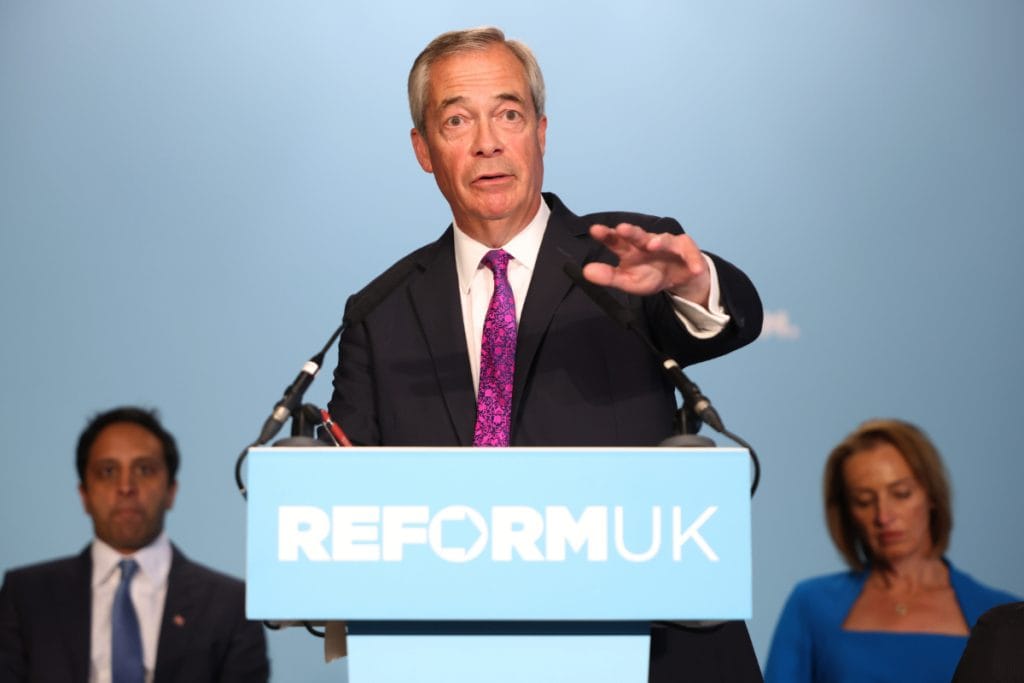
Monday 23 June 2025 12:51 pm
| Updated:
Monday 23 June 2025 1:01 pm

Reform UK’s new ‘Robin Hood’-style non-dom policy has been given a cool reception by top UK tax experts, who have branded it as “too cheap” and warned it could even cost the UK £34bn in lost tax revenue.
Nigel Farage’s party, which currently tops the opinion polls, unveiled plans for a £250,000 flat tax regime for wealthy foreigners, the proceeds of which would be channelled directly into the bank accounts of the 2.5m workers in the bottom-earning decile of the working population.
Under the proposal, non-doms who pay the one-off fee in exchange for what Reform has dubbed the ‘Britannia Card’, would immediately earn the right to live and work in the UK for a decade without their foreign income or gains being liable to British taxes.
The scheme is similar to those currently in place in Greece and Italy, which have both benefited from an influx of former UK-based non-doms after the government chose to scrap the old non-dom regime in last year’s Autumn Budget. But industry experts have accused Reform top brass of not charging enough for the ‘card’, highlighting “very serious problems” bound up in any practical rollout.
‘Bonkers’
James Quarmby, a founding partner of Stephenson Harwood’s private wealth team, endorsed the scheme’s up-front and non-refundable approach to taxing non-doms, while branding other elements of it “bonkers”.
“I like his policy but… it’s way too cheap,” he told City AM. “The UK has way more to offer than Italy or Greece, so something around £100,000 to £150,000 [per year] would be about right. Up front that’s £1m or £1.5m. If we attract 10,000 non-doms, which would be easy, then that’s £15bn in new revenue.”
“The rest of Nigel’s plan is bonkers,” he added. “It’s weird tax policy. Tax goes to [the Treasury] and the government should spend it on front line services or benefits. Just handing out tax-free cash randomly is silly.”
Writing in The Telegraph, Farage said “We will rebuild the social contract by ensuring that every wealthy individual who wishes to move here makes a tangible contribution to Britain’s lowest earners.”
Speaking at the launch of Reform’s non-dom policy on Monday, the party’s former chair Zia Yusuf said: “We looked to price it based on a number that people would love to pay… this is not taxing people or working hard in this country against their wishes and redistributing it. This is money coming from people who would not otherwise be here. And remember, it is just the start of their economic relationship with the tax, with the Exchequer.”
Reform non-dom policy has ‘significant problems’
But Tax Policy Associates founder Dan Neidle said there were “several significant problems” with the plan, a direct attempt from Reform to stem the outflow of non-doms that has triggered a wave of high-profile departures and reports of a 20 per cent hit to London’s super-prime property market.
“[The policy as outlined by Reform] would discourage highly skilled professionals from moving here – they couldn’t afford the £250,000 and would face a much worse tax outlook than they ever have in the UK,” he added.
Neidle, a former head of tax at Clifford Chance, continued: “[It would also] provide a very large and expensive tax windfall to a small number of very wealthy people who are already here. Office for Budget Responsibility data shows that this would amount to £34bn of lost government revenue over five years.”
Others questioned whether the the policy would be able to prevent the outflow of wealthy residents unless the current government adjusted course before the next election.
Miles Dean, head of international tax at estate planning shop Andersen, said: “I fear that the damage has already been done and I doubt that this alone is enough to entice wealthy non-doms back, especially given that implementation is at least 4 years away.”
And Leslie Macleod-Miller, chief executive of non-dom lobby group Foreign Investors for Britain said: “Reform have challenged the other political parties to make a clear and urgent statement that they welcome global wealth and understand the red lines impacting them.”
He added: “We urge the government not to wait until all the golden geese have flown. The time to act is now—by listening to business and those who benefit from frontline services, and by making a clear statement of intent to retain and attract the world’s most dynamic investors before it is too late.”







